
Get up to 3 quotes by filling in only 1 quick form

Compare quotes and find yourself the best deal

Increase the value of your home by installing a new boiler
- Householdquotes.co.uk
- Combi Boiler Cost
Combi Boiler Cost in the UK: Prices, Installation and More (2024)

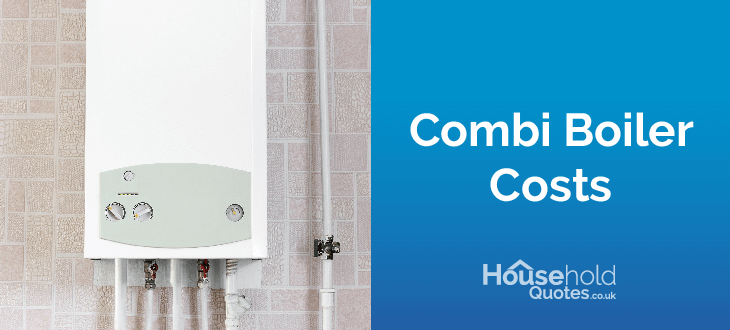
If you are looking to upgrade your heating system with a combi boiler, naturally one of the first things you will want to look into is the combi boiler cost.
In this article, we give you an overview of the estimated new boiler cost for combi boilers, giving you an indication of the prices in the UK in 2024. We also discuss the following points:
- How much different combi boiler models cost
- What affects the cost of installing or replacing a combi boiler
- How to choose the right boiler for your home
- How to find the best deal for a new combi boiler
- Answers to your frequently asked questions.
Additionally, we help you take the first steps towards having a new combi boiler fitted in your home. Here, you can request boiler quotes for combi boilers and installation costs from local engineers who can work on your heating system. By comparing multiple quotes, you can find the best deal for a new combi boiler for your home and avoid being overcharged.
Ready for a new combi boiler? Simply click below to fill in our 30-second form and request quotes from installers near you.
- Quotes from local installers
- Payment by finance available
- Save up to £975
It only takes 30 seconds

How much is a combi boiler in the UK? Costs in 2024
On average, combi boilers cost somewhere between £500 and £3,000, excluding installation costs. However, the total price depends on several different factors. One of the most significant aspects that impact the cost of a new combi boiler is the size of your home and, especially, how many bedrooms and bathrooms you have. For example, the best combi boiler for a 3 bed house will range from £1,100 to £2,000 with installation included.
Smaller homes can make do with less powerful boilers often at the lower end of the price range. If your home has up to two bathrooms, a small combi boiler might be of interest to you. Larger homes need more powerful (but also more expensive) boilers to ensure that everyone gets enough hot water. If you’re unsure which is best you should compare combi boiler vs system boiler to find the best size for your home.
The table below shows the estimated combi boiler prices per house type.
| House Type | Number of Bedrooms | Number of bathrooms | Estimated Cost (Including Installation) |
|---|---|---|---|
| Flat | 1-3 | 1 | £1,595-£2,500 |
| Bungalow | 2-4 | 1 | £1,595-£2,500 |
| Terraced House | 2-4 | 1 | £1,595-£3,225 |
| Semi-detached House | 3 | 1 | £1,595-£2,500 |
| Semi-detached House | 4-5 | 2 | £1,595-£3,225 |
| Detached House | 3 | 1 | £1,595-£2,500 |
| Detached House | 4-5 | 2 | £1,595-£3,225 |
As far as the installation process is concerned, combi boilers can be fitted within 1 day. It can take longer (around 2-3 days) if new or additional pipes are required or if the placement of the boiler needs to change within your home.
This makes combi boilers some of the most affordable and easily installed types of heating systems that you could go for. Additionally, the most efficient combi boiler often boasts a 94% efficiency.
When it comes to heat pumps vs combi boilers, for example, heat pumps do cost significantly more to buy, without financial help in the form of a grant, and the scale of the installation is far greater in most cases.
Combi boiler prices for the most popular brands in the UK

While the size of your home can affect the cost of a new or replacement combi boiler, the price can also vary depending on the manufacturer and model you choose.
To help you get a clearer idea of the different brands available in the UK today, we provide an overview of some of the most popular brands and boiler models below. The technical specifications and prices we reference are for gas combi boilers and exclude installation costs.
Worcester Bosch combi boiler prices
Worcester Bosch is a brand that is highly regarded by both homeowners and installers. They are known for their reliable products and offer some of the longest standard warranties for boilers. Below is a rundown of some of the Worcester combi boiler prices in the UK this year.
| Boiler Model | Power Output | Size of the Home | Estimated Cost |
|---|---|---|---|
| Greenstar i Junior | 24 kW | Small (1-2 bedrooms and 1 bathroom) | £800-£900 |
| Greenstar Highflow CDi | 29 kW | Medium (3-4 bedrooms and 2-3 bathrooms) | £2,130-£2,475 |
| Greenstar CDi Classic | 30-35 kW | Large (5 or more bedrooms and 4 bathrooms) | £1,700-£2,400 |
Learn about combi boiler flow rate in our helpful guide.
Vaillant combi boiler prices
Vaillant offers boilers high quality boilers and great customer service should any issues with your appliance arise. In the table below you will find Vaillant boiler prices for some of their most popular models on the market.
| Boiler Model | Power Output | Size of the Home | Estimated Cost |
|---|---|---|---|
| EcoFIT Pure | 25kW | Small (1-2 bedrooms and 1 bathroom) | £840-£1,160 |
| EcoFIT Sustain | 25kW | Small (1-2 bedrooms and 1 bathroom) | £1,250-£1,500 |
| EcoTEC Plus | 29kW | Medium (3-4 bedrooms and 2-3 bathrooms) | £1,100-£1,500 |
Baxi combi boiler prices
When it comes to Baxi boilers, they are some of the most efficient and affordable appliances available in the UK. You can learn more about Baxi boiler prices in the following table:
| Boiler Model | Power Output | Size of the Home | Estimated Cost |
|---|---|---|---|
| Baxi 800 | 25-35 kW | Small-Medium (1-4 bedrooms and 1-3 bathrooms) | £980-£1,200 |
| Baxi Platinum | 24-28 kW | Small (1-2 bedrooms and 1 bathroom) | £930-£1,020 |
| Baxi Duo-tec | 24-40 kW | Small-Large (1-5 bedrooms and 1-4 bathrooms) | £815-£1,000 |
Ideal combi boiler prices
Ideal provides homeowners with high-efficiency and cost-effective products. They also offer quality customer care and are known to quickly solve any issues your boiler might have. We have compiled a list of Ideal boiler prices for some of their most popular models below:
| Boiler Model | Power Output | Size of the Home | Estimated Cost |
|---|---|---|---|
| Ideal Independent Plus | 24-35 kW | Small-Medium (1-4 bedrooms and 1-3 bathrooms) | £1,050-£1,265 |
| Ideal Logic | 24-35 kW | Small-Medium (1-4 bedrooms and 1-3 bathrooms) | £845-£1,400 |
| Ideal Vogue Max | 26-40 kW | Small-Large (1-5 bedrooms and 1-4 bathrooms) | £1,210-£1,400 |
Now that you have a better idea of the price range of different boiler brands, the next step is to find the exact cost of having a new combi boiler fitted in your home. To determine the price that applies to your situation, you will need to contact a specialist.
Fortunately, we have made it easy for you to get in touch with reputable installers. Rather than wasting hours researching installation companies, all you have to do is fill in our form in 30 seconds to request quotes from local heating engineers. You can then compare the prices you receive to find the best deal for a combi boiler installation for your home.
Click below to request free quotes today!
- Quotes from local installers
- Payment by finance available
- Save up to £975
It only takes 30 seconds

Combi boiler prices fitted: Installation cost in the UK
The cost of the boiler itself is not the only expense you need to account for when planning to install a new combi boiler in your home. Yet another aspect you must consider is the installation costs involved.
The installation costs for a combi boiler can range anywhere between £700 to £2,000. It is important to note that these numbers are estimates and that only the installer you choose to work with can offer you the exact cost for their installation services.
Depending on the price range of the boiler brand you choose, the following average installation costs can apply to you:
| Type of boiler | Price (excluding installation) | Installation costs | Price (fitted) |
|---|---|---|---|
| Economy combi | £500 – £1,500 | £700 – £2,000 | £1,200 – £3,000 |
| Mid-range combi | £1,500 – £2,500 | £700 – £2,000 | £2,200 – £4,500 |
| Top-end combi | £2,500 – £3,000 | £700 – £2,000 | £3,200 – £5,000 |
What influences the cost of a combi boiler installation
In addition to the price of the boiler itself, you will need to factor in installation costs into the total expenses of having a new combi boiler fitted in your home.
Therefore, the final cost of your boiler installation depends on several factors, such as the boiler manufacturer, whether you’re moving your boiler, if the pipework needs to be upgraded at the installation site, which accessories you choose, whether you need to replace your radiators, or work with a local or national installer.
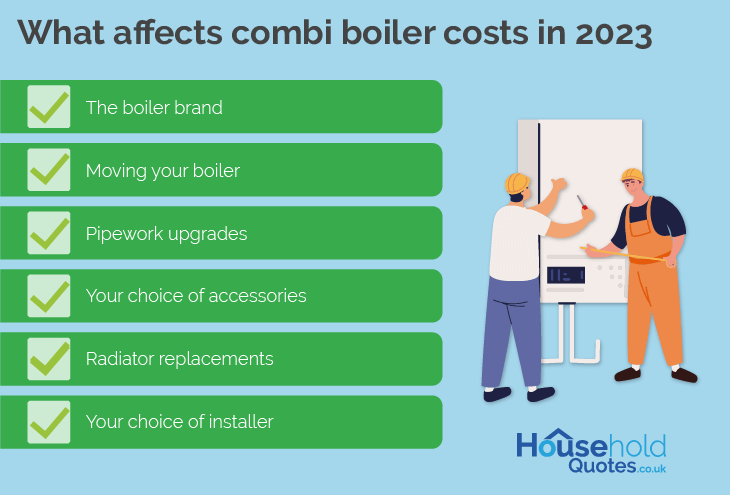
1. The boiler manufacturer
As you can see in the tables above, different boiler brands have different prices. So, the manufacturer you choose will impact the total cost of your new combi boiler.
2. Whether you want to move your boiler
If you want to have your new boiler fitted in another location within your home than your previous boiler, you will require additional pipework. This will increase the final cost of your combi boiler installation.
3. If you need to upgrade your pipework
If the pipes at the installation site need to be replaced to ensure that your new combi boiler can function properly, you will be spending more on your boiler installation. It’s also worth noting that, if your home is built after 2025, it may not have a gas main for a boiler. They are potentially being phased out for newer properties as part of a gas boiler ban under the Future Homes Standard.
4. Your choice of accessories
Upgrading your home heating system with smart controls and thermostats is an optional decision. Just keep in mind that these accessories will also impact the total cost of your new combi boiler.
5. If you plan to upgrade or replace your radiators
Depending on the number of radiators you have, choosing to upgrade or replace them will add to the total cost of your heating system. If you want to add new radiators in a room, the pipework involved will also impact the price of your project.
6. Whether you work with a local or national installer
Working with national installers will cost you more than the services of local heating engineers. This is because local installers won’t have running costs (like helpline fees) to uphold.
Costs of replacing an old boiler with a new combi boiler
The total cost of your boiler upgrade will depend on the kind of replacement you are looking for. You can opt to replace your old combi boiler with a new one, changing from a conventional boiler to a combi, or remove your system boiler to install a combi boiler.
Replacing a combi boiler with a new combi boiler
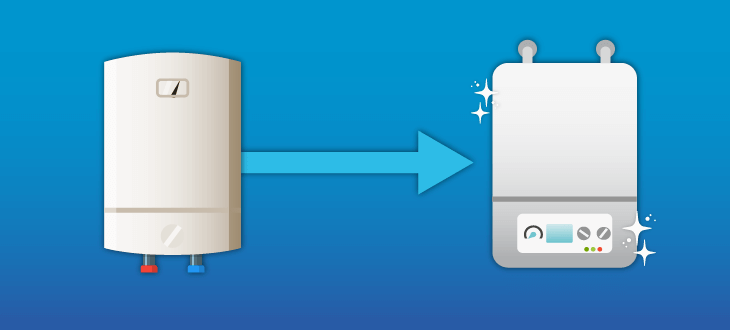
This swap can be made fairly easily, as the pipework required should already be in place at the installation site. Unless you decide to move your boiler to a new location within your home, you will not have to worry about high additional expenses. On average, your new combi boiler installation will cost somewhere between £1,700 and £3,500.
Replacing a conventional boiler with a combi boiler
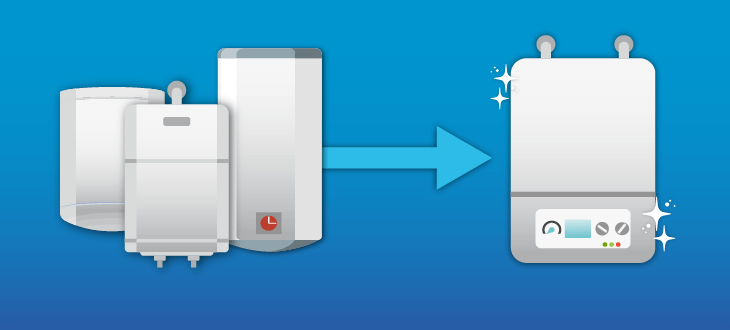
This kind of replacement is a great option if you want to improve the efficiency of your heating system. Because replacing a conventional boiler requires additional labour when it comes to pipework and removing the many parts of your old boiler, the total cost of your boiler upgrade can be around £2,500-£4,500. This is similar to back boiler replacements, which include the same components as conventional boilers.
Replacing a system boiler with a combi boiler
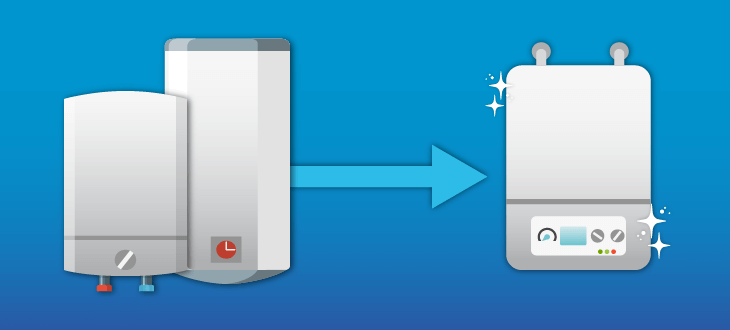
If you want to improve the hot water supply in your home, you might be looking to replace your system boiler with a combi boiler. This swap will also save you space in your home, as you will no longer require a hot water cylinder. The cost of replacing a system boiler ranges somewhere between £1,500 and £3,000.
It is important to note that the numbers we mention here are only estimates. What can help you get an even clearer idea of how much a boiler replacement would cost is comparing multiple quotes for combi boiler installation services.
By requesting quotes from heating engineers, you get more accurate prices and you can compare installation costs to find the best deal for your home.
Find the best combi boiler prices in the UK and get free quotes
Once you have decided which brand of combi boiler you want to have fitted in your home, you will want to find the best combi boiler deal for your new installation. As we have explained, there are a few factors that affect the total cost of a combi boiler, so you will want to consider each of them, including which is the best gas boiler, to find the combi boiler that best fits your financial situation.
Additionally, finding the best deal requires some research into installation companies. We know that this process can seem daunting. It can take hours of reading through reviews to find the right installer.
To make things easier, we have done the research for you and found a network of reputable heating engineers you can trust. All you have to do now is fill in our form in 30 seconds and request quotes. You can then compare information from several installers to find the best deal for your new combi boiler.
Click below to get started today!
- Quotes from local installers
- Payment by finance available
- Save up to £975
It only takes 30 seconds

Frequently asked questions
You can expect to spend around £1,595 to £2,500 if you have a 3-bedroom house. However, the price also depends on the kind of house you have.
You can expect to pay anywhere around £2,500 – £3,000 for a high-quality combi boiler, depending on its size, manufacturer, and other features.
Yes, having a new combi boiler fitted can be quite an expense, as the installation can cost somewhere between £700 and £2000. Nevertheless, there are some things you can do to lower the costs, keeping in mind the different factors that affect the price of a combi boiler.
One of the best ways to find great deals for combi boilers is by comparing boiler and installation costs across multiple companies. You can start by requesting quotes from local heating engineers to find the best deal for your home.

Sabria Schouten is a content writer dedicated to helping readers make informed decisions when it comes to their energy consumption.
- Combi Boiler Cost in the UK: Prices, Installation and More (2024)
- How much is a combi boiler in the UK? Costs in 2024
- Combi boiler prices for the most popular brands in the UK
- Combi boiler prices fitted: Installation cost in the UK
- Find the best combi boiler prices in the UK and get free quotes
- Frequently asked questions
